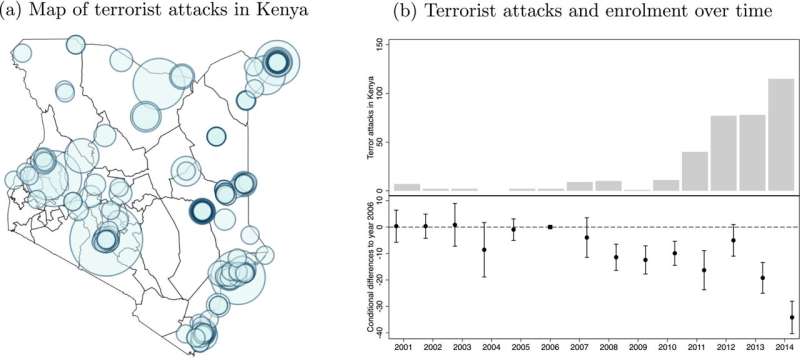
A recent study by Joseph-Simon Görlach of Bocconi University, Milan, in collaboration with Marco Alfano of Lancaster University, has highlighted the severe consequences of terrorism on education in Kenya. The paper, titled “Terrorism and Education: Evidence from Instrumental Variables Estimators,” published in the Journal of Applied Econometrics, uses an innovative approach to analyze the effect of terrorist attacks on school enrollment.
The study is based on a detailed analysis of data from Kenya, a country severely affected by attacks from the terrorist group al-Shabaab. Using novel instruments to predict the location and timing of terrorist attacks, the researchers found that each terrorist attack reduces the number of children enrolling in school at entry age on time by one percentage point. Moreover, the study finds no effect of terrorist attacks on teacher absences, suggesting that parents’ fear is the driving force behind the reduction in schooling.
According to Professor Görlach, “The impact of terrorism on education is devastating and goes far beyond the immediate physical consequences of the attacks. The fear and uncertainty caused by terrorism have a lasting effect on families’ decisions to send their children to school.”
Terrorism represents a growing threat globally, with the number of attacks rising over the last 20 years. In Kenya, most attacks are attributed to the al-Shabaab group, affiliated with al-Qaeda, which has conducted numerous attacks targeting civilians and security forces. The study highlights how the fear of further attacks deters parents from enrolling their children in school, with long-term negative consequences for the country’s education and economic development.
The situation in Kenya is indicative of a broader problem affecting many regions worldwide. Terrorist attacks continue to undermine the foundations of civil society, disproportionately affecting the most vulnerable communities.
Educational and security policies should thus be integrated to address not only immediate threats but also to mitigate the long-term effects of terrorism on education and mental health. Moreover, the international community should intensify efforts to disrupt the funding sources of terrorist groups.
As Görlach emphasizes, “cutting off these groups’ financial resources is essential to reducing their operational capacity and, consequently, protecting future generations from their destructive influences.”
More information:
Marco Alfano et al, Terrorism and education: Evidence from instrumental variables estimators, Journal of Applied Econometrics (2024). DOI: 10.1002/jae.3058
Citation:
Study highlights the impact of terrorist violence on education (2024, June 3)
retrieved 4 June 2024
from https://phys.org/news/2024-06-highlights-impact-terrorist-violence.html
This document is subject to copyright. Apart from any fair dealing for the purpose of private study or research, no
part may be reproduced without the written permission. The content is provided for information purposes only.







